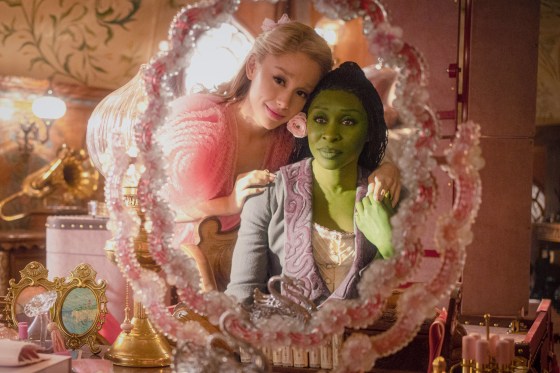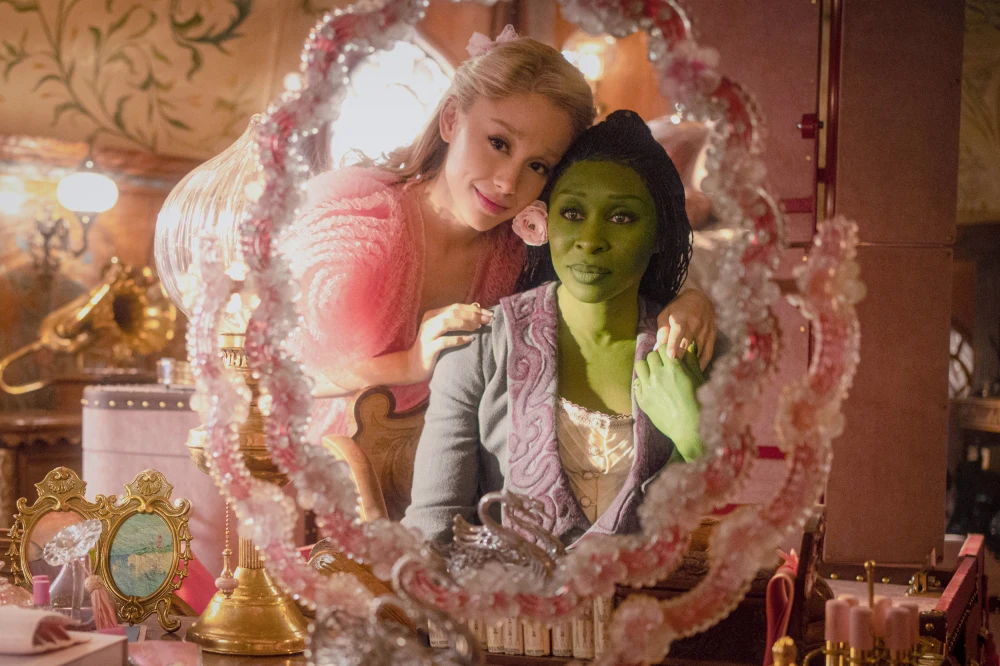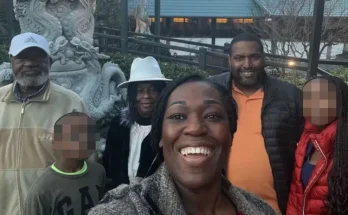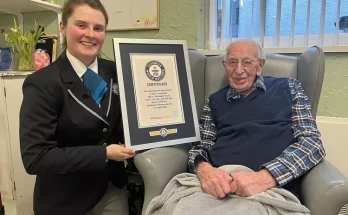The movie and musical versions of “Wicked” are based on the 1995 novel by Gregory Maguire, following the friendship between Elphaba and Glinda.

The beloved story of “Wicked” has just made its debut on the big screen, and fans of the onstage musical might notice some changes.
Both the movie and musical versions of “Wicked” are based on the 1995 novel by Gregory Maguire, following the friendship between Elphaba and Glinda — two witches popularized by the “Wizard of Oz.”
The “Wicked” film adaptation is split into two parts. The first movie, which hit theaters Nov. 22, follows the events and songs of Act 1 of the musical. “Wicked: Part 2” is expected in November 2025.
Director Jon M. Chu tells TODAY.com that he approached making the film adaptation from “a very specific perspective.”
“I saw it for the first time in San Francisco before it made it to Broadway,” he says, referring to the musical’s 2003 tryout performances before it opened at the Gershwin Theatre. “Those are like core memories of when Glinda comes down in the bubble and during ‘Defying Gravity,’ ‘What Is This Feeling?’ — these things stayed with me through all of those years.
“So I feel like I channel that first time seeing it,” Chu adds.
Composer Stephen Schwartz and “Wicked” screenplay writer Winnie Holzman say when the show opened on Broadway in October 2003, they “couldn’t imagine being in November of 2003, having survived until that” — much less a film adaptation.
But once they did make it to November 2003, and the show proved a success, “we knew eventually it was going to be a movie,” Schwartz says.
“So really for 20 years, we’ve been talking, particularly Winnie and myself, about ‘Well, in the movie, what if we do this? Maybe we should try that?’” Schwartz says. “We’ve been thinking about it for a long time, but what was most important to us was to tell our story in the movie.”
The first “Wicked” film is faithful to Act 1 of the musical, all the way down to the soundtrack. No songs were cut, and with the exception of one song “expansion” — as composer Stephen Schwartz puts it — the tracks are true to the original Broadway cast recording.
But there are some minor changes that devoted “Wicked” fans may pick up on.
Chu notes that even if what happens on screen isn’t exactly what happened on the stage, his goal was “re-enacting those moments that I felt back then.”
“What it felt like was happening, I tried to do that in the movie,” he says.
Here’s what to know about the differences between the “Wicked” film and musical.
The length
Despite being only a portion of the beloved musical, the movie runs over two and a half hours, nearly as long as the full Broadway production.
“This one movie is longer than the first act,” Schwartz says. “It’s the equivalent of the first act in terms of the storytelling, but it’s as long as our whole show.”
Holzman says Chu felt “really confident” about the decision to split the movie in two. Once that happened, she says she had “freedom” to slow down moments that may have happened quickly in the musical.
“There were so many moments that we … really wanted to take and — ” Holzman says.
“Give them a chance to breathe,” Schwartz adds.
Trying to fit all of the “Wicked” musical into one film would have been a “burden,” Schwartz says.
“It was great not to constantly feel, with every musical moment, with every scene, ‘Oh, we simply don’t have time,’” he says. “Once that burden was lifted, it was very inspiring.”
Both Schwartz and Holzman wrote new songs and scenes for Part 1 that didn’t end up in the final cut.
“We tried to be very careful that anything we expanded was additive and not padded,” he says.
An expanded backstory for Elphaba and Nessarose
In both “Wicked” the musical and movie, Elphaba’s backstory is explored in the opening track, “No One Mourns the Wicked.” The song, sung by Glinda, walks through how Elphaba’s mom drank a green elixir before having an affair, which ultimately leads to her baby arriving with a tinted skin tone. After Elphaba is born, her father wants nothing to do with her.
But the movie takes a beat to show what her childhood looked like. After her birth, Elphaba’s nanny, a bear named Dulcibear, raises the child and vowed to look after her. Her relationship with her younger sister Nessarose is also explored more deeply.
“There are things that go past in lightning speed, like the two sisters,” Holzman says of the “Wicked” musical. “When you first meet them, if you blink, you miss their conversation.”
In the movie, there’s a scene where Elphaba is bullied as a child for her appearance. It also establishes a loving and protective relationship with Nessarose by showing Elphaba fight back after the kids make her sister cry.
Nessarose, played by Marissa Bode, also asserts independence in the film. Bode, who is the first actor to play Nessarose who uses a wheelchair in real life, says her character goes off to attend Shiz University to be on her own and “prove to yourself that you can, even though you already know that you can,” Bode says.
In the musical, Elphaba arrives at Shiz as an enrolled student under strict orders to look after her sister. In the movie, however, Elphaba isn’t enrolled, and only stays at school after she accidentally uses her powers, catching the eye of Madame Morrible (Michelle Yeoh).
More details on the Grimmerie
While most of the songs of the “Wicked” movie soundtrack are the same as the musical, “One Short Day” has a notable addition.
The song follows Glinda and Elphaba as they arrive in the Emerald City to meet with the Wizard of Oz. The movie’s version of “One Short Day” includes new bars of music sung by — much to Broadway fans’ delight — Idina Menzel, who originated the role of Elphaba, and Kristin Chenoweth, the original Glinda.
In the cameo, they jokingly battle for the spotlight and sing some of their iconic riffs.
Menzel and Chenoweth perform as part of the Emerald City players troupe, taking on the roles of fabled Wise Ones who wrote down their spells in a book known as the Grimmerie.
The Grimmerie ends up being the key to Elphaba unlocking her powers and transforming into a witch, and the movie gives more details on how it led to the Wizard assuming power.
According to the Wise Ones’ prophetic song, “in Oz’s darkest hour,” a powerful figure with the ability to read the Grimmerie will come along and lead Oz. That person ended up being the Wizard, after he landed in Oz via a hot air balloon. Now can he actually read the Grimmerie? That’s another story.
‘Wizard of Oz’ Easter eggs
“Wicked” is notably a prequel story to “The Wizard of Oz,” but Part 1 of the film offers more Easter eggs to L. Frank Baum’s story and the 1939 film.
While both the film and musical open with the rousing musical number “No One Mourns the Wicked,” set after the death of the Wicked Witch of the West, the movie firmly places the story in time with “The Wizard of Oz.”
The first scene of the film features the voice of Ariana Grande’s Glinda declaring the Wicked Witch of the West dead. The camera pans to a black witch’s hat sitting atop a puddle of water, a reference to how the witch melted in the 1939 film after Dorothy threw a pail of water at her.
“We drop into a crime scene. We don’t drop into a big musical number, we drop into a puddle of water,” Chu says. “To me, that was really important to return us to the scene of the crime, the place we last left Oz.”
From there, Oz comes into full focus. Viewers see someone escaping a castle on horseback. Then the camera pans to the yellow brick road, as the figures of Dorothy and her companions follow the path toward the Emerald City.
The focus then moves into Munchkinland, and the opening notes of “No One Mourns the Wicked” kick in.
In another “Wizard of Oz” connection, the movie changes a scene to involve poppy flowers. After Dr. Dillamond is removed from his teaching position, a new teacher brings in a lion cub to teach a lesson on cages. Elphaba, noticing the cub is trembling, casts a spell in the musical to cause chaos and help rescue the animal.
But in the movie, Elphaba accidentally uses poppy flowers to put everyone in the classroom — except for herself and Jonathan Bailey’s Fiyero — to sleep. Then, they rescue the cub and set him free in the wild.
The poppies seem to foreshadow a scene in the “The Wizard of Oz” when the four main characters — Dorothy, Scarecrow, Tin Man and the Cowardly Lion — travel through a field of the same flowers. In the story, both Dorothy and the Lion fall asleep.



